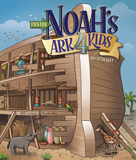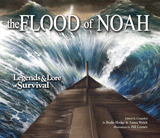Tell a Fairy Tale Day: Distinguishing Fact from Fiction
February 26 is Tell a Fairy Tale Day. If you grew up with bedtime stories, this “holiday” might sound childish—possibly goofy. But as with fairy tales, there’s an important lesson ahead.
The world is full of great tales with lessons in character and morality. Little Red Riding Hood teaches children not to talk to strangers. Hansel and Gretel is a cautionary tale about taking food from strangers. The Three Pigs is a lesson in hard work. While parents should exercise caution in which fairy tales their children read, many stories are often fun, meaningful, and subtly instructive in truth.
However, we must be careful to distinguish fact from fiction to children and the unsaved world. Children comprehend that Hansel and Gretel is fiction. After all, there are no houses of candy in the woods—a logical fact they quickly recognize. But the lines between fact and fiction often blur in light of so-called Bible stories and illustrated Bible storybooks.
Consider a common illustration of Noah’s ark: two elephants, giraffes, tigers, monkeys, bears, zebras, and snakes cram on the deck with Noah on an ark clearly too small to hold the fifteen of them, let alone two of every kind plus Noah’s family and food supplies. The “cute” animation and term story can confuse children about the truth of God’s Word and make them see it as a fairy tale rather than history. They see Noah’s ark as nothing more than a tale.
Think about three well-known “tales”: “The Owl and the Pussy-Cat,” Of Plymouth Plantation, and Noah’s Ark. Each tells of adventures on the high seas:
The Owl and the Pussy-cat went to sea
In a beautiful pea-green boat,
They took some honey, and plenty of money,
Wrapped up in a five-pound note.1
So they committed themselves to the will of God, and resolved to proceed. In sundry of these storms the winds were so fierce, and the seas so high, as they could not bear a knot of sail, but were forced to hull, for divers days together.2
Then the Lord said to Noah, “Go into the ark, you and all your household, for I have seen that you are righteous before me in this generation. Take with you seven pairs of all clean animals, the male and his mate, and a pair of the animals that are not clean, the male and his mate, and seven pairs of the birds of the heavens also, male and female, to keep their offspring alive on the face of all the earth. For in seven days I will send rain on the earth forty days and forty nights, and every living thing that I have made I will blot out from the face of the ground.” And Noah did all that the Lord had commanded him. (Genesis 7:1–5)
It’s easy for children to see the fiction in the first, for an owl and a pussycat will not set sail together in the real world. It’s easy to see the fact of the second, for Of Plymouth Plantation is a firsthand account of America’s history, and it’s taught as such. But people too often call Noah’s ark a Bible “story” rather than Bible history, sometimes assuming that children will know that a “Bible” story must be true.
Sadly, many children and adults, including some professing believers, believe that the Bible is more a book of legends and tall tales than a book of historical facts. This false portrayal of the Bible hurts the witness of believers and opens the doors to secular worldviews, like evolution, that conflict with the Genesis account of creation.
Today is a day to celebrate fairy tales—and they do have a place. Feel free to read one of your favorites or make one up to delight the children in your life. But when it comes to the Bible, be sure to present it as authoritative truth, an authentic history, from the very mouth of the Creator of the Universe, lovingly written for those who bear his image.
Footnotes
- Edward Lear, “The Owl and the Pussy-Cat,” The Poetry Foundation, https://www.poetryfoundation.org/poems/43188/the-owl-and-the-pussy-cat.
- William Bradford, Of Plymouth Plantation, in The Norton Anthology of American Literature, shorter 9th ed., vol.1: Beginnings to 1865, edited by Robert S. Levine (New York: W W Norton & Company, 2017), 75–76.
Recommended Resources

Answers in Genesis is an apologetics ministry, dedicated to helping Christians defend their faith and proclaim the good news of Jesus Christ.
- Customer Service 800.778.3390
- © 2024 Answers in Genesis





